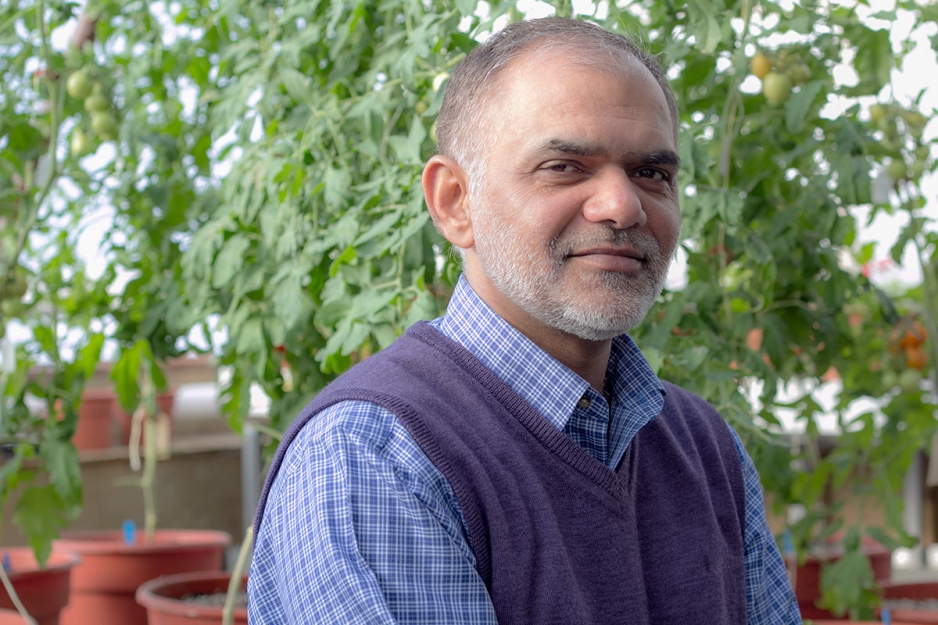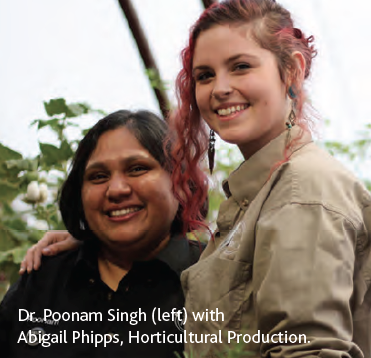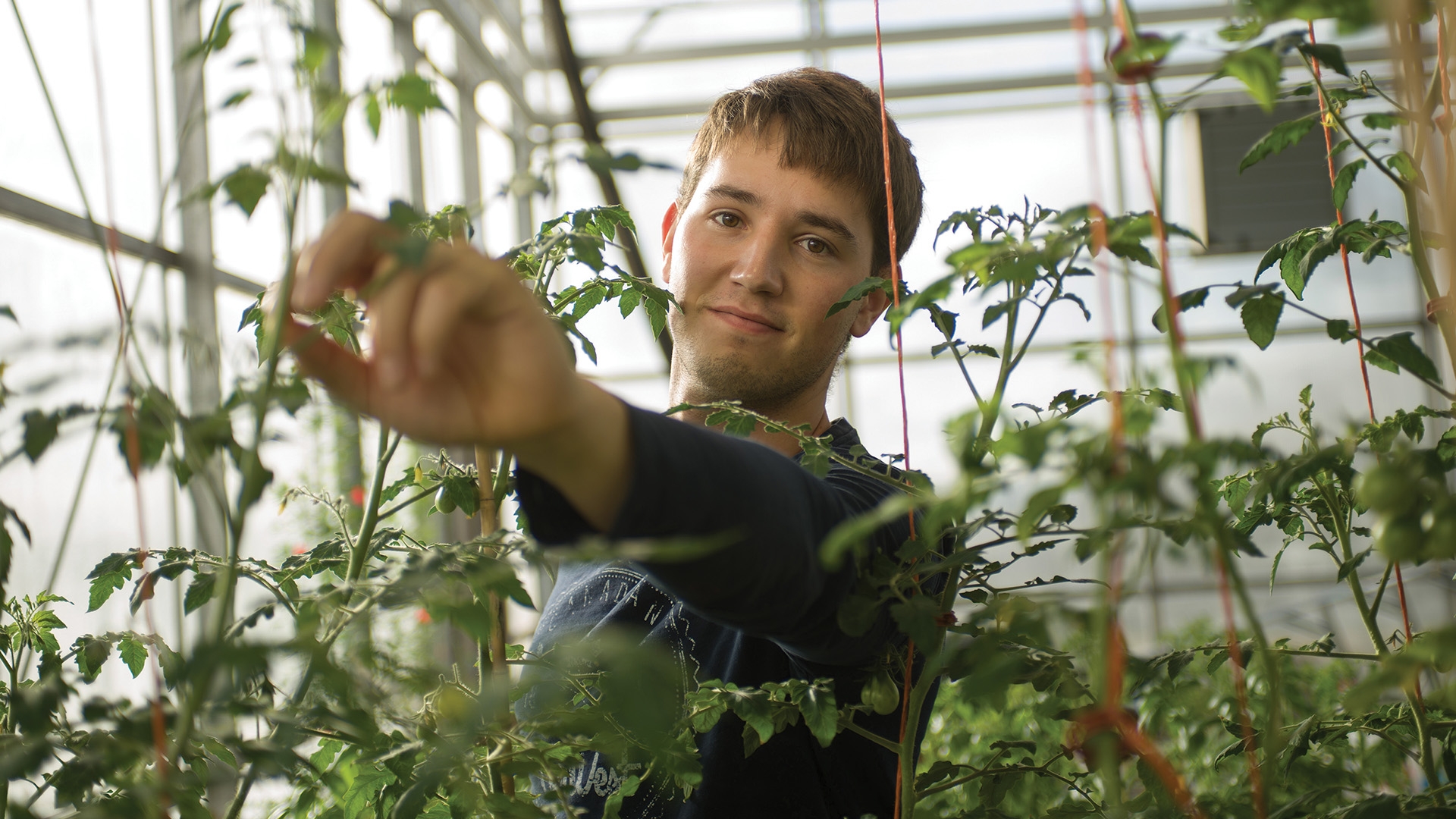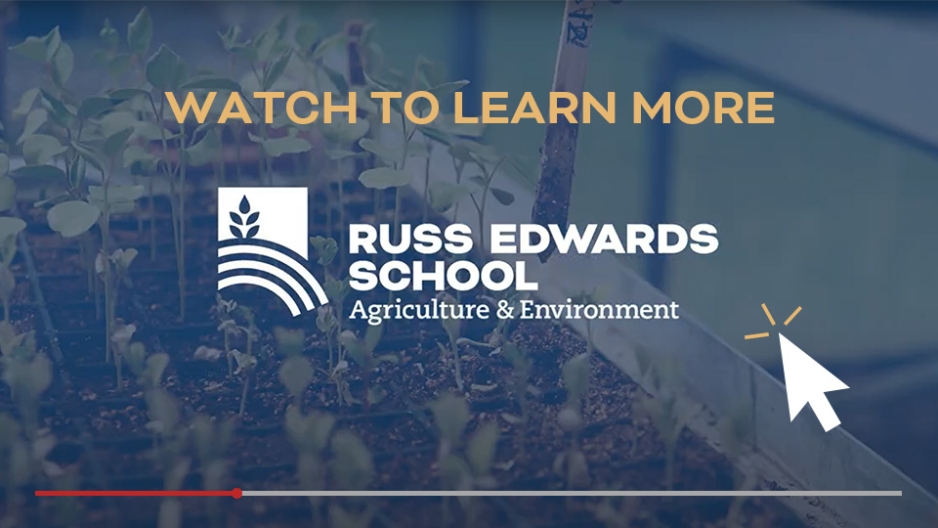Sustainable Food Systems
Overview
Assiniboine’s nine-month Sustainable Food Systems advanced diploma provides training to work in the agri-food sector on problems of food security. Courses emphasize innovation in how food is produced and how harvests are managed, all in the context of food security, inside the greenhouse or in the field.
Graduates can access exciting work opportunities in food security or innovation in food production at the local, national or international level.
Potential employers include the private sector, government departments, First Nations or nongovernmental organizations.
KEEP ME IN THE LOOP!
Fill out the form below to receive more information about our program and related events.
Program Learning Outcomes
- Analyze the social, economic, and environmental factors that contribute to food insecurity, and propose solutions that promote sustainable and equitable access to healthy food.
- Apply horticultural practices and technologies, to increase yields and improve the efficiency of food production.
- Evaluate the nutritional value and quality of horticultural products, and develop strategies to optimize their production and distribution to meet the needs of diverse communities.
- Assess the risks and benefits of different horticultural production systems, including conventional, organic, and regenerative horticulture, and develop strategies to mitigate negative impacts and promote sustainability.
- Design and implement food security programs and policies, in collaboration with community stakeholders, that address the root causes of food insecurity and promote long-term food security.
- Evaluate the economic viability of different horticultural enterprises.
- Use tools to analyze and optimize horticultural production and distribution systems, including supply chain management, transportation, and storage.
- Develop and implement strategies to manage pests and diseases in horticultural crops, using sustainable and environmentally-friendly methods.
- Manage and operate a greenhouse facility, including understanding the principles of greenhouse design, climate control, and irrigation systems.
- Cultivate and manage a variety of crops in a greenhouse environment, including understanding plant physiology, growth requirements, and pest and disease management strategies specific to greenhouse crops.
- Understand and comply with relevant safety regulations and guidelines, including those related to chemical handling, equipment operation, and personal protective equipment.
- Communicate effectively with diverse stakeholders, including horticulturalists, policymakers, community members, and industry professionals, about food security issues and solutions in the horticultural sector.
Examples of what graduates from this program can do:
- Implement sustainable farming practices.
- Engage in policy development and advocacy work.
- Start, manage, or work in sustainable food businesses.
- Help design, develop, and assess sustainable food system strategies.
- Contribute to research projects focused on sustainable food systems.
Success Factors
You might be a good fit for this program if you would enjoy:
- A nine-month program to build upon your previous education including related fields, such as environmental science, biology, nutrition, or public policy, and want to specialize in sustainable food systems and food security.
- Learning more about sustainable agriculture practices and how to grow and market crops in a sustainable and environmentally-friendly way.
- Passionate about food justice, food access, and food sovereignty, and want to develop the knowledge and skills to effect positive change in communities.
- Starting or expanding a sustainable food-related business.
- Interested in the intersection of food systems and health outcomes, and who want to develop the knowledge and skills to promote healthy and sustainable food access in communities.
- Potential to work in a variety of communities and rural settings.
- Collecting, organizing, and analyzing data to solve problems.
A valid driver’s license and access to a vehicle is strongly recommended given the potential need to travel for practicum placement.
The industry and program environment require individuals to:
- Have physical strength and stamina as well as the mobility and motor skills to undertake the required tasks.
- Work in outdoor settings in varied terrain.
Admissions
Admission Requirements
- Two-year diploma or university degree
English is the language of instruction at Assiniboine. All applicants educated outside of Canada or in a country not on the test exempt list are expected to meet the English language proficiency requirements.
READY TO TAKE THE NEXT STEP IN YOUR EDUCATION JOURNEY?
Start your online application today and join Assiniboine College!
DON'T HAVE A DEGREE OR DIPLOMA? START HERE.
We understand that a fulfilling career in environmental science is not only for those who already hold academic qualifications. If you're at the beginning of your journey and do not have a diploma or degree, consider exploring our Horticultural Production program at Assiniboine.
Careers & Connections
Career Opportunities
- Food security
- Innovation in food production at the local, national or international level
- Private sector
- Government
- First Nations’ organizations
- Research
Connections
Assiniboine has a number of agreements with other colleges, universities and professional organizations, making it possible to apply credit taken at Assiniboine to programs at other institutions. For information on agreements, see Articulation Agreements.
Upon completion of this program, graduates will have the following certifications:
- First Aid
Tools & Supplies
Our classrooms, labs and shops are equipped with the necessary equipment that you need to make the most of your experience. However, there are some tools and supplies that you will need to purchase for personal use to help you with your studies. Much of what you purchase you’ll be able to use after you graduate and begin your career. This program features a fully-equipped greenhouse, tools and equipment, garden, orchard, field labs, growth chamber, classrooms and computer labs.
Program Checklists, Textbooks, and Supplies
Program Checklists:
Textbooks:
Supplies:
ASSINIBOINE BOOKSTORE
Textbooks, supplies and uniforms may be purchased at the Assiniboine Bookstore at the Victoria Avenue East Campus. Booklists, tool lists and supply lists are available from your school office 30 days prior to the start date of your program.
Technology Requirements
Students in this program are required to bring their own laptop for use on-campus. The laptop must meet the technical needs outlined by the program. See Technology Requirements for detailed information.
Courses & Costs
Costs
Estimated Program Costs (Domestic students)
| Credits | 63.0 |
| Tuition | $4,090 |
| Course Fees | $1,540 |
| Students' Association fees (including Health Premium) | $635 |
| Estimated textbooks, tools, and supplies | $700 |
All fees are estimated and subject to change without notice.
Estimated Program Costs (International students)
| Credits | 63.0 |
| Tuition | $17,140 |
| Course Fees | $1,540 |
| Students' Association fees (including Health Premium) | $635 |
| Required Health Insurance | $825 |
| Estimated textbooks, tools, and supplies | $700 |
All fees are estimated and are subject to change without notice. All international students must purchase health insurance. The college adds this fee to your student account and then sends your name and fee to the insurance provider on your behalf.
For more information, visit the Fees and Charges page.
Courses
To graduate with a Sustainable Food Systems advanced diploma, students must successfully complete 60 academic credits and 3 practical credits. The minimum passing grade for each course is indicated on the course outline. Course offerings are subject to change and may vary by intake.
Courses
| Title | Credits/CEUs | Elective | Distance | PLAR |
|---|---|---|---|---|
1st Aid - Emergency (HLTH-0030)Basic First Aid and CPR techniques taught in an interactive environment for individuals and employees who want an overview of First Aid and CPR in the workplace or home. The course covers skills needed to recognize, prevent and respond to cardiovascular emergencies for adults, CPR and other topics such as choking, airway and breathing emergencies, and prevention of disease transmission. This course meets the minimum regulations for Workplace Health and Safety for Basic First Aid. Participants who meet the required standard receive a nationally recognized certification that is valid for three years. |
0 credit(s) | No | No | No |
Business of Food Production (AGRC-0282)This course covers classification systems, crop production practices and processes, post-harvest handling and marketing of food crops. Students examine and apply the concepts of sustainable production programming and integrated food crop management practices for a successful food production business. The student will also learn advanced techniques and innovations in fruit and vegetable production through highlights of new research, traditional approaches, and in-class activities and other assignments. Students will be responsible for completing an independent project that demonstrate problem-solving abilities and innovation in food production. |
6 credit(s) | No | No | No |
Career and Business Planning (BUSN-0159)This course provides students with a practical approach to preparing and presenting a comprehensive business and a career plan. Students will be introduced to the preparation of business and marketing plans as well as elements of e-commerce and project management. Both traditional business models and social enterprise will be emphasized throughout. The principal goal of this course is to have students prove their capability to develop and implement organizational strategies in simulated business situations. |
6 credit(s) | No | No | No |
Crop Production Systems (AGRC-0219)Prerequisite: AGRC-0278 Food Production Methods |
6 credit(s) | No | No | No |
Food Production Methods (AGRC-0278)This course provides hands-on experience in practical methods and techniques used in food production systems. The course focuses on advanced food production practices including techniques used in crop improvement and plant propagation of horticultural crops. Students learn about and perform practices in evaluation of morphological processes of seed and plant growth development, application and management of fertilizers, and greenhouse food production management programs. Students are responsible for completing an independent project that demonstrates problem-solving ability and innovation. |
6 credit(s) | No | No | No |
Food Security & Sustainability (AGRC-0284)This course introduces students to topics related to safety and security of the food supply, including food safety legislation, safe food handling practices, food labeling, traceability and processes to improve food safety. Students will examine social, ecological and economic principles of sustainability with regards to food production systems by critically analyzing topics like climate change, plant genetic resources, soil, water, air quality, genetically modified foods, traditional and contemporary food production, consumerism and food consumption patterns. Students will evaluate the implications of industrial and alternative agricultural systems on food safety, security and sustainability. |
6 credit(s) | No | No | No |
Food Systems Applied Research (AGRC-0274)Students will be introduced to project management principles and to the skills needed and issues involved in the conception, design and implementation of innovation projects related to sustainable food systems. This course will culminate in a student-led and industry/community-responsive project. Each student or group will be assigned an appropriate project relevant to the food industry in Canada. The project outcome will be presented as an individual written report. |
6 credit(s) | No | No | No |
Growing Media Applications (AGRC-0276)Students will examine the components and properties of various growing media including soils, soilless, hydroponic, compost mix and other media substrates. Topics like soil-water relationships, plant nutrition, soil bio-physico-chemical properties will be studied by performing various soil sampling and testing methods. Students will be introduced to state-of-the-art innovations in soil and other media management as they relate to sustainable plant production. Students will be responsible for completing an independent project that demonstrates problem-solving ability and innovation in growing media applications. |
6 credit(s) | No | No | No |
Integrated Pest Management (AGRC-0094)Principles of Integrated Pest Management (IPM) are introduced and include identifying, monitoring, forecasting and managing environmental and pest conditions that impact horticulture crops including weeds, viruses, bacteria, phytoplasmas, fungi, algae, protozoa, nematodes, arthropods and rodents. Students learn to diagnose problems, provide solutions and predict how the manipulation of growing conditions can impact other factors of production. Topics include basic chemistry, legislation and regulations, labeling, toxicity, handling practices, environmental protection, application equipment, emergency response and public relations. Students are responsible for completing an independent project that demonstrates problem-solving ability and innovation in the IPM field. |
6 credit(s) | No | No | No |
Practicum - STFDS (PRAC-0263)This course requires a minimum of 120 hours of food systems related experience. The work practicum is subject to prior approval of and monitoring by a faculty member. Credit is based on successful completion of the work practicum plus a presentation based on the student's work experience. Work experience acquired prior to registration in the program is not eligible for this credit. |
3 credit(s) | No | No | No |
Sustainable Greenhouse Mngmt (AGRC-0287)This course examines the sustainable production, handling and marketing of greenhouse-grown vegetables and herbs in seasonal and year-round greenhouse operations. Topics include environment control systems, planning and planting schedule, media control and plant management, water systems, composting, water nutrient capture, cleaning and sanitation. Sustainable approaches to greenhouse management will be explored through in-class activities and other assignments. Students will be responsible for completing an independent project that demonstrates problem-solving ability and innovation in greenhouse management. |
6 credit(s) | No | No | No |
The Food Industry (AGRC-0288)In this course students will be visiting a variety of food related industries, exploring and learning different concepts and skills set related to the industry. Students will gain experience by working closely with a diverse range of industry operations and procedures while acquiring knowledge and advanced industry-specific skills. Various aspects of food production and processing facilities operations, regulations, and practical application and implementation of quality programs are also reviewed in this course. The knowledge and skills acquired in this course will prepare students for specialized careers in the food industry and for advanced studies at the university level. |
6 credit(s) | No | No | No |
Staff
Sajjad A. Rao BSc, MSc, PhD

Dr. Rao is an accredited Canadian Plant Breeder and Agrologist, with over 25 years of progressive experience in applied research and teaching. Dr. Rao holds a PhD degree in plant science from The University of Liverpool, England U.K.
He has served in many academic and research positions, committees, boards of directors, and as an external examiner for post-graduate research studies with various universities. In addition to his academic work, Dr. Rao has experience working for multinational agricultural companies, holding senior-level management positions in which he developed a passion for leadership in R&D strategies.
In his professional career, Sajjad has made significant contributions in developing wheat varieties for North America, and in commercializing corn hybrids in the Asian-Pacific sphere. Currently, Dr. Rao’s research engages him in innovation of sustainable greenhouse production technologies, food systems, and in employing novel genetics in horticultural and agronomic field crops.
Poonam Singh BSc, MSc, PhD

Dr. Poonam Singh joined the college in 2015 as a Professor of Horticultural Science in the Horticultural Production and Sustainable Food Systems programs. She holds a Bachelor of Science in Agriculture, a Bachelor of Education degree, a BC Provincial Instructor diploma, a Masters of Science in Landscaping and Floriculture, and a Doctorate in Horticulture.
Dr. Singh’s work history includes working as a Research Fellow at the Institute of Himalayan Bioresource Technology (India), as an Assistant Professor at the Punjab Agricultural University (India), as a Scientist at the Institute for Sustainable Horticulture, BC, and as a faculty member at the School of Horticulture, Kwantlen Polytechnic University, BC.
Dr. Singh’s research focuses on developing sustainable technologies for the greenhouse production of horticultural crops, evaluating new soilless media/substrates, hydroponic crop cultures, vertical farming, and horticultural crop physiology. Dr. Singh has been working in various applied research projects aimed at adopting sustainable practices and improving the production efficiency of horticultural farms. Dr. Singh’s collaborative project with Mayfair farms (Portage La Prairie, MB) and the Vegetable Growers of Manitoba Association provided Manitoba onion producers with critical information on the incidence and prevalence of Botrytis neck rot disease and options for its management. In another collaborative research project with Shelmerdine Garden Center (Winnipeg, MB), she developed sustainable pest management strategies for use in commercial floricultural greenhouses. This approach gave customers organic, pesticide-free products and helped the nursery industry keep up with the changing trends of the horticulture industry. Another partnership with Vermillion Growers (Dauphin, MB) helped them to adopt sustainable crop production technologies by testing the latest products and technologies like root-zone oxygenation, biofertilizers, growth promotors, bio-stimulants to enhance greenhouse vegetable production. Her current research project with Vanderveen's Greenhouse Ltd. (Carman, MB) focuses on exploring new soilless growing media blends to partially or completely replace peat for improving the production of ornamental crops in greenhouses. Dr. Singh’s research is helping growers in reducing production costs, increasing resource efficiency, and contributing to long-term economic and environmental sustainability.





